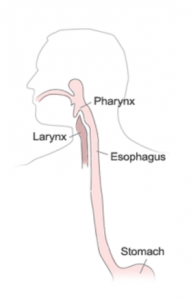Swallowing Disorder (Dysphagia)
What is Dysphagia?
Swallowing disorders, also known as dysphagia, have been found to occur in five to 15 percent of the population. It is estimated that 15 million Americans have discomfort or difficulty swallowing.
Drinking a glass of water, or eating a meal are simple, everyday activities that can give us great pleasure and at the same time be so automatic that we take them for granted. However, normal swallowing of food and liquid requires a great deal of coordination of a large number of muscles in the mouth, throat (pharynx) and esophagus.
The act of swallowing is divided into three phases:
- The oral or mouth phase — moving food or liquid into the throat.
- The pharyngeal or throat phase — squeezing food down the throat and closing the airway to prevent choking.
- The esophageal phase — relaxing and tightening the openings at the top and bottom of the esophagus and squeezing food through the esophagus into the stomach.

Normal swallowing is safe because the larynx or entrance to the windpipe is closed as food passes. The food is normally moved efficiently through the mouth and throat with little trace of food left behind. When larger amounts of food are swallowed at a time, the swallow takes longer and the muscles of the mouth and throat work simultaneously. At times we hold our breath to protect the windpipe as we prepare to swallow. While normal swallowing may change at times depending on how much or what type of food is swallowed, the safety and efficiency of swallowing do not change.
What Are The Causes of A Swallowing Problem?
Swallowing problems (dysphagia) can be grouped into two categories:
Oropharyngeal Dysphagia
These swallowing problems happen before food reaches the esophagus and may result from neuromuscular disease or obstructions. Patients experience difficulty starting a swallow; food goes down the wrong pipe, or there is choking and coughing. This may result in poor nutrition or dehydration, aspiration (which can lead to pneumonia and chronic lung disease) or embarrassment in social situations that involve eating. Conditions that may cause oropharyngeal dysphagia include Alzheimer’s disease, Lou Gehrig’s disease, brain injury, cerebral palsy, multiple sclerosis, muscular dystrophy, Parkinson’s disease, spinal cord injury, stroke, Zenker’s diverticulum, cervical osteophytes or other obstructions.
Esophageal Dysphagia
These swallowing problems originate in the esophagus. Food or liquids “stick” in the chest or throat and sometimes come back up. Causes include mucosal rings, esophageal cancer, esophagitis, gastroesophageal reflux disease (GERD) and esophageal motility disorders. Individuals with dysphagia should seek a thorough examination because swallowing problems may indicate cancer of the head, neck or esophagus.
What Are The Signs And Symptoms of Dysphagia?
Signs and symptoms of swallowing disorders include:
- Coughing or choking when eating or drinking
- Changes in voice quality when eating or drinking
- Food or liquid leaking from the mouth or getting stuck in the throat
- Extra time needed to eat or drink
- Recurrent pneumonia
- Weight loss
- Dehydration
What Are The Risk Factors of Dysphagia?
The following are risk factors for dysphagia:
- Aging. Due to the natural aging process and normal wear and tear on the esophagus, older adults are at higher risk of swallowing difficulties. But, dysphagia may not be a normal sign of aging.
- Certain health conditions. People with certain neurological or nervous system disorders are more likely to experience difficulty swallowing.



